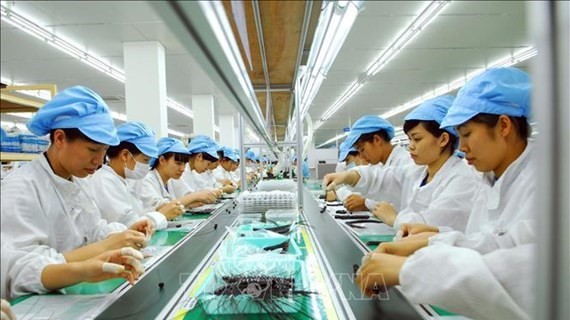Vietnam is an attractive investment destination for foreign investors due to its high and stable economic growth, large domestic market and young, well-educated human resources, said Paulo Medas, head of the International Monetary Fund (IMF) team to Vietnam at the recent Annual Meetings of the IMF and the World Bank Group (WB) held in the US.
According to Medas, despite rising geopolitical instability globally, Vietnam’s economy experienced a growth rate of 5.66% in the first quarter of this year. Exports continue to see an upward trend, facilitating overall growth until the end of this year.
He projected that Vietnam’s economic growth is predicted to expand by nearly 6% this year due to the recovery of domestic demand and supportive fiscal policies from the government. However, he noted that Vietnam needs to maintain a flexible fiscal policy to manage risks and ensure sustained growth.
 |
| A production line at the Republic of Korea’s Bluecom Vina Co., Ltd, in the Trang Due Industrial Park in Hai Phong city. Photo: VNA |
The expert said that the country continues to receive a significant amount of foreign direct investment amid the shifting of supply chains to Asia and Vietnam is among the preferred investment destinations for foreign investors.
Nonetheless, to maintain its attractiveness, Vietnam should continue to improve its business environment, streamline administrative procedures, develop infrastructure, especially for green energy development, and foster innovation, he added.
Meanwhile, Director of the Department of Industry and Construction Statistics under the General Statistics Office Phi Thi Huong Nga highlighted FDI attraction as a key contributor to the country’s economic achievements in the three months, indicating a positive start for the year.
Vietnam’s strong economic outlook has bolstered foreign investors’ confidence in the country, as reflected by their investment of $6.17 billion in the first quarter of this year, a 13.4% increase year-on-year, according to the Foreign Investment Agency under the Ministry of Planning and Investment.
Of this total, newly registered capital stood at $4.77 billion, marking a 57.9% increase from the same period last year. Additionally, $934.6 million was added to 248 ongoing projects, and $466.2 million was allocated for stake purchase and capital contribution, showing a decrease of 22.6% and 61.7% in value, respectively.
The foreign investment inflow originated from 62 countries and territories. Singapore emerged as the largest investor in Vietnam during the period with a total registered capital of over $2.55 billion, a 51.3% increase, followed by Hong Kong (China) with $1.05 billion, representing an increase of 2.3 times.
The capital city of Hanoi attracted the highest FDI inflow with a surge of $970.8 million, six times higher than the same period last year, followed by the northern province of Bac Ninh with $745.2 million.
However, foreign investors have expressed concerns about certain limitations, such as cumbersome administrative procedures, inconsistent investment attraction policies, and an incomplete supply chain, in addition to the positive factors of political stability and improved human resources.
In response, Prof. Dr. Nguyen Mai, Chairman of Vietnam’s Association of Foreign Invested Enterprises (VAFIE), emphasized the importance of prioritizing the improvement of institutions and legal frameworks.
Ranjit Thambyrajah, Chairman and CEO of Acuity Funding, recommended that Vietnam allocate more resources to education and training to provide industries with a skilled workforce.
Furthermore, he suggested that the country develop fully integrated and energy-neutral industrial parks that meet the demands of modern manufacturing.



